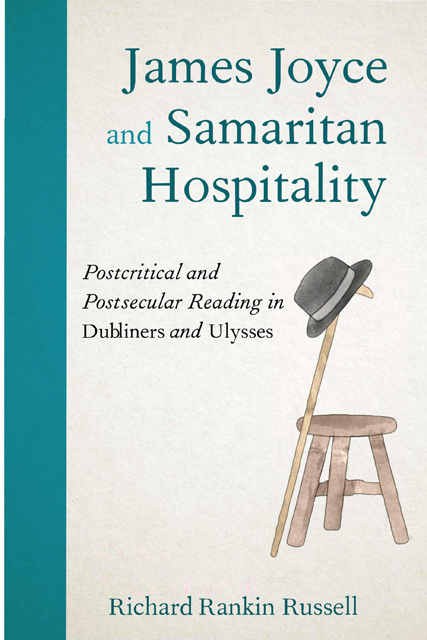Book contents
- Frontmatter
- Contents
- Preface and Acknowledgments
- List of Abbreviations
- Introduction
- 1 Haunted by Hospitality in “The Dead”
- 2 Joyce, Scripture, and Autobiographical Rescue Narratives
- 3 Rewriting the Good Samaritan Parable: The Fictional Rescue Narratives of “Grace” and “Circe”
- 4 Bloom as Stranger and Samaritan in “Cyclops,” “Oxen of the Sun,” and “Circe”
- 5 “In orthodox Samaritan fashion”: The Parabolic Encounter between Stephen and Bloom in “Eumaeus”
- 6 Home to “Ithaca” and “Penelope”: Bloom’s Hospitality and Stephen and Molly’s Reactions
- 7 Enfleshed Ethics and the Responsibility of the Reader in the Good Samaritan Parable and the “Nostos” of Ulysses
- Coda: “Go thou and do likewise”: Postcritical and Postsecular Reading through a Joycean Hermeneutics of Hospitality
- Works Cited
- Index
3 - Rewriting the Good Samaritan Parable: The Fictional Rescue Narratives of “Grace” and “Circe”
Published online by Cambridge University Press: 25 April 2023
- Frontmatter
- Contents
- Preface and Acknowledgments
- List of Abbreviations
- Introduction
- 1 Haunted by Hospitality in “The Dead”
- 2 Joyce, Scripture, and Autobiographical Rescue Narratives
- 3 Rewriting the Good Samaritan Parable: The Fictional Rescue Narratives of “Grace” and “Circe”
- 4 Bloom as Stranger and Samaritan in “Cyclops,” “Oxen of the Sun,” and “Circe”
- 5 “In orthodox Samaritan fashion”: The Parabolic Encounter between Stephen and Bloom in “Eumaeus”
- 6 Home to “Ithaca” and “Penelope”: Bloom’s Hospitality and Stephen and Molly’s Reactions
- 7 Enfleshed Ethics and the Responsibility of the Reader in the Good Samaritan Parable and the “Nostos” of Ulysses
- Coda: “Go thou and do likewise”: Postcritical and Postsecular Reading through a Joycean Hermeneutics of Hospitality
- Works Cited
- Index
Summary
But what of the incident the night of June 22, 1904? While references to it have become obligatory in investigations of Joyce’s representations of “the Jew,” very few thoughts beyond the argument over its mere occurrence have been offered.
Neil R. Davison, James Joyce, Ulysses, and the Construction of Jewish Identity, 105Joyce’s affinity for scriptural stories arose again around the time he was conceiving Ulysses—and likely stemmed from the almost certainly apocryphal encounter with Alfred H. Hunter, as we have seen, and his later mugging in Rome. Using the Torah as his analogy, Declan Kiberd has convincingly argued that Joyce saw Ulysses as a “holy book” replete with “divine wisdom in the text.” He posits that “Joyce was someone who snooped around old texts looking for a back door through which to effect an entry. The New Testament was one such text and a major element in the creation of Ulysses.” No one until Kiberd has made such a succinct and telling statement of the New Testament’s influence on the creation of the novel. And yet even Kiberd, despite his clear recognition of Joyce’s secular “gospel” inhering in the mandate to love our neighbor, neglects his reiteration of the Good Samaritan parable as epitomizing that message.
After writing short stories and a play and some poetry, Joyce settled upon what we might now call “long-form fiction,” the novel, as his preferred genre, and that preference (as well as his having left the Catholic Church) may well have contributed to the refusal of many critics to employ religious interpretations of Ulysses. As Justin Neuman has shown, of all genres, the novel has most resisted religious readings. First, the novel’s rise as a genre was largely coincident with “European secularization.” Moreover, because of the genre’s reliance on narratives of ordinary individuals, which repudiated “the transcendental frames of reference within which allegories, romances, and epics forge their meanings,” the “question of immanence prompts scholars to differentiate novels from other prose forms.” Finally, the tendency of novels to be “rhizomatic, presenting a multitude of voices and styles through which the active reader must negotiate” is a characteristic “at odds with secularist ideas about religious dogmatism and the monolingualism of a divinely authored text.
- Type
- Chapter
- Information
- James Joyce and Samaritan HospitalityPostcritical and Postsecular Reading in Dubliners and Ulysses, pp. 63 - 86Publisher: Edinburgh University PressPrint publication year: 2023



